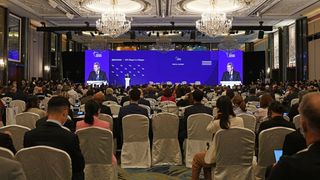On 2-4 June, more than 550 delegates from across the Asia-Pacific, Europe, North America and beyond will convene in Singapore for the 20th International Institute for Strategic Studies (IISS) Shangri-La Dialogue, an annual event to discuss and debate the region’s most pressing security challenges. USSC Foreign Policy and Defence Research Fellow Tom Corben outlines what we can expect from the 20th edition of Asia’s premier strategic forum.
Australia’s Prime Minister Anthony Albanese is scheduled to deliver the keynote address that will open the dialogue. The next day, US Secretary of Defense, Lloyd Austin, will also take to the summit’s stage for a major speech on the United States’ leadership in the Indo-Pacific. What can we expect the leaders to highlight about the roles of Australia and the United States when it comes to pressing regional security challenges?
I would expect Secretary Austin to reflect on recent breakthroughs in key US regional defence partnerships over the last year – things like the access locations added to the US-Philippines Enhanced Defence Cooperation Agreement with the Philippines, new force posture and defence technology projects being pursued with Japan, and of course, the various forms of defence industry and technology cooperation through AUKUS – as well as offer some indication of what the Biden administration hopes to do next on this front. It will also be interesting to interpret what the secretary has to say regarding the state of US-China relations, given recent reporting around China's refusal to 'pick up the phone' or meet with US Department of Defense counterparts, the overall deterioration of the relationship following 'Balloon-gate', and the concerns that many Indo-Pacific countries have about what these trends portend for regional stability and crisis management in the event of confrontation in the South China Sea, around the Taiwan Strait, or elsewhere. In that sense, Austin will look to reinforce the image of the United States as an enduring, good-faith guarantor of regional security in Asia, even as it seeks to manage an increasingly antagonistic relationship with the region's other resident great power, China.
As for Prime Minister Anthony Albanese, this will be a great opportunity to outline his government's overall approach to the Indo-Pacific, particularly considering that this speech will open the dialogue. I would expect him to outline how Australia is seeking to take key defence partnerships in the region to the next level, whether that be in the Pacific Islands through initiatives like the new bilateral security agreement with Papua New Guinea, or through enhanced engagement in Southeast Asia with the likes of Indonesia and the Philippines. Though Albanese is unlikely to mention the Quad explicitly in terms of defence cooperation, I suspect that he will devote special attention to the strides being made in Australia's bilateral defence relationship with India and trilaterally with Japan and the United States, as well as outlining the value of the Quad's non-defence contributions to regional security. In all of this, I suspect that we will hear a strong emphasis on the major themes animating Australian foreign policy under the Albanese government: the multipolar nature of the regional security order, the need to achieve 'strategic equilibrium' in this order, and the genuine agency that Australia and others have in shaping the regional balance of power – in other words, a view that regional security can and should be determined by much more than the actions and prerogatives of the United States and China.
Maritime security is set to be a key agenda item at this year’s summit, with events tackling issues like defence cooperation in the Indian Ocean region and Asia’s evolving maritime security order. Why is maritime security so vital to regional peace and stability? Are there any important areas for cooperation you are hoping to see debated and discussed?
Maritime security naturally enjoys pride of place when it comes to regional security discussions, given the geography of the region that we live in. In fact, it is in the maritime domain where we are seeing the sharper edges of strategic competition between the United States, China and other regional powers come to the fore. In that context, I suspect that we'll see leaders from Australia, Japan, the US and other likeminded countries make reference to the importance of freedom of navigation and overflight across key regional waterways, condemn coercive activities conducted by regional countries' coast guards, navies and commercial or fishing fleets in other countries' exclusive economic zones or territorial waters, and emphasise the importance of stability across the Taiwan Strait – all code for Chinese malign behaviour in the South China Sea. These statements are all par for the course, in that they are regular features of bilateral statements on regional security matters issued by Australia and these partners, but will likely be delivered with a touch more nuance given the audience and location of the Shangri-La Dialogue in Southeast Asia.
Perhaps more interestingly, we may also get a glimpse of the contours of new forms of maritime defence cooperation between Australia, the United States, and other regional partners. For example, the defence ministers of Australia, Japan, the Philippines, and the United States will meet together for the first time ever on the sidelines of the dialogue. The outcomes of this engagement will be worth watching, given the new logistics and access agreements struck with the Philippines by the other three countries, the increasing quantity and quality of defence equipment being donated or sold to Manila by these countries, and discussions across the different constituent bilateral configurations about the potential for conducting joint patrols in the South China Sea.
What should Australians pay close attention to when reviewing the dialogue’s developments and outcomes?
While there may be some specific initiatives or tangible deliverables that emerge on the sidelines of the dialogue, for the most part Australians should be paying close attention to the tone struck and signals sent in the remarks made by the leaders and defence ministers of key regional countries. These will tell us about their countries' respective vision for regional security in the Indo-Pacific. Australians will obviously be paying close attention to the tone and substance of the remarks delivered by US Secretary of Defense Lloyd Austin and what they portend for the United States' Asia strategy over the coming year. But they should also pay particular attention to the remarks delivered by China's new Minister of Defence Li Shangfu, especially in light of the corroding relationship between Beijing and Washington following the 'Balloon-gate' saga and China's coercive behaviour in the maritime domain across the Indo-Pacific. The remarks by the Japanese representative will also be worth noting, given Japan's trio of new national security documents and its recently-established Official Security Assistance program, all of which have a heavy emphasis on shoring-up regional deterrence.
I suspect that the Australian Government will also be especially attentive when it comes to any remarks that might be made by leading officials from Southeast Asia and the South Pacific about AUKUS and the Quad, two of Australia's top-tier vehicles for addressing regional security challenges. Recent remarks by these officials suggests that Australia's messaging and engagement efforts regarding the intent and purpose of AUKUS and the Quad are enjoying greater traction across the region. Shangri-La could provide further evidence to this effect or demonstrate whether Australia and its partners still have work to do on this front.






